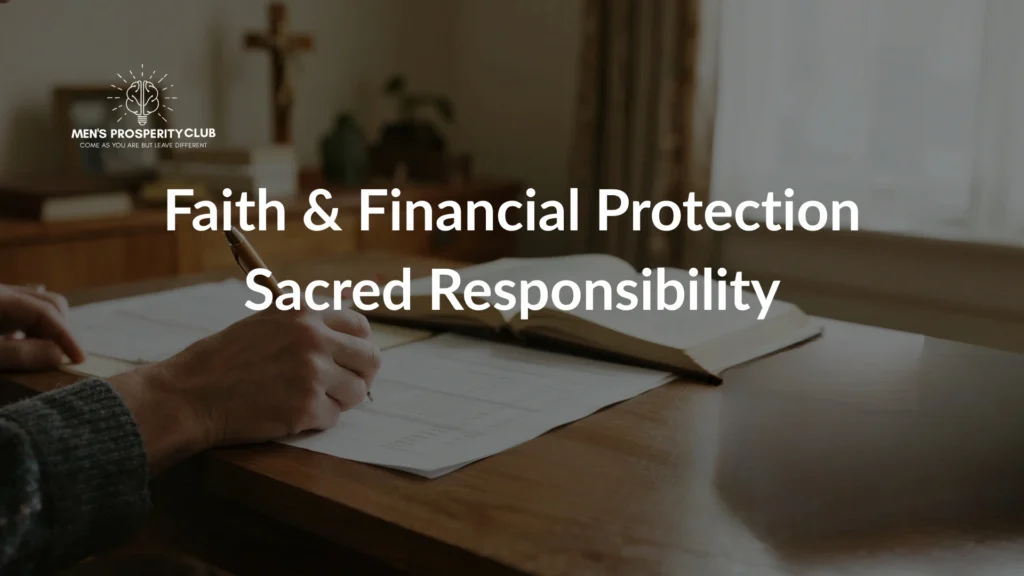Faith transcends prayer and worship; it encompasses the practical responsibility of protecting those we cherish most. Consequently, financial protection becomes more than prudent planning—it transforms into a sacred duty that bridges spiritual values with tangible action.
The Foundation of Faithful Stewardship
Throughout every spiritual tradition, stewardship emerges as a fundamental principle. Moreover, this concept extends beyond caring for our immediate needs to encompass our families, health, time, and financial wellbeing. Therefore, as people of faith, we’re called to act as responsible guardians of what we’ve received.
Furthermore, this responsibility manifests itself in practical ways across British society. Record numbers of people have taken out income protection insurance to protect their finances against the risk of a serious accident or illness stopping them working, with sales of individual income protection policies hitting a record 247,000 last 2023. Additionally, protection insurers paid out a record £7.34 billion to support individuals and families in 2024, demonstrating the vital role these safeguards play in British households.
This surge in protection awareness reflects a growing understanding that faithful stewardship requires both spiritual commitment and practical action. Indeed, when we examine the lives of those who’ve successfully navigated financial crises, we consistently find individuals who combined prayer with preparation, hope with planning, and trust with tangible steps towards security.
Transforming Prayer into Protective Action
Many individuals pray fervently for protection, guidance, and provision. However, authentic faith demands more than hopeful requests—it requires intentional preparation. Indeed, implementing financial protection serves as one of the most meaningful ways to live out our spiritual convictions practically.
Life assurance ensures your family maintains financial stability even during your absence. Similarly, critical illness cover provides essential support during health crises, whilst income protection safeguards your lifestyle when illness or injury prevents work. Importantly, these solutions stem from love rather than fear, declaring to your family: “Even if I cannot be present physically, I’ve ensured your security.”

The Sacred Nature of Financial Planning
Contemporary financial planning transcends mere wealth preservation. Instead, it focuses on protecting what truly matters most—your family’s dignity, your children’s opportunities, and your voice continuing beyond your presence.
A record 4.7 million people were covered by Private Medical Insurance through their employer in 2023—the highest in more than 30 years of data collection. This trend reflects growing awareness that financial protection represents responsible stewardship rather than anxious planning.
When you protect your income, you simultaneously protect your household’s stability. When you protect your life, you preserve your legacy’s continuation. When you protect your future, you maintain your peace of mind.
Modern Challenges Requiring Faithful Responses
Today’s economic landscape presents unique challenges that require faithful, proactive responses. Rising living costs, increasing healthcare expenses, and economic uncertainty create pressures that previous generations rarely experienced. In 2024, property claims data revealed payouts reached a record £4.1 billion, highlighting the escalating financial risks facing British families.
Nevertheless, these statistics shouldn’t generate fear; rather, they should inspire responsible action. Sales of standalone critical illness policies totalled 75,700—nearly four times higher than ten years ago, indicating that more people recognise financial protection as essential stewardship rather than optional luxury.
Furthermore, workplace benefits are expanding significantly. Employers increasingly understand that supporting their workforce’s financial security strengthens both individuals and organisations. Therefore, many companies now offer comprehensive protection schemes as standard benefits, recognising that employee wellbeing directly impacts productivity and loyalty.
The pandemic particularly highlighted the importance of financial resilience. Families who had established protection found themselves better equipped to navigate unexpected challenges, whilst those without adequate coverage often faced difficult choices between financial stability and health considerations. This experience reinforced the wisdom of preparing for uncertainty whilst trusting in providence.
The Spiritual Dimension of Financial Advice
Professional financial guidance becomes particularly meaningful when viewed through a spiritual lens. Indeed, when clients share their deepest hopes and fears, they’re essentially saying: “I want to honour those I love properly.” This conversation transcends mere financial planning—it becomes a sacred dialogue about values, priorities, and legacy.
This desire transcends financial calculation—it represents a profound spiritual commitment. Faith calls us to care actively, prepare thoughtfully, and act with clear intention. Consequently, establishing appropriate protection demonstrates trust in divine provision whilst taking responsible action for our earthly responsibilities.
Moreover, the relationship between advisor and client often mirrors spiritual mentorship. Both require trust, honesty about vulnerabilities and commitment to long-term wellbeing rather than short-term gains. When financial advisers approach their work with reverence for their clients’ hopes and dreams, they participate in something far greater than transactional business relationships.
Practical Steps Towards Faithful Protection
Begin by assessing your current situation honestly and prayerfully. What would happen if your income suddenly stopped? How would your family manage financially during a health crisis? These questions aren’t morbid curiosities—they’re essential considerations for responsible stewardship that require both spiritual discernment and practical evaluation.
Next, explore available options systematically whilst seeking wisdom through prayer and counsel. Life assurance, income protection, and critical illness cover each serve distinct purposes in your financial protection strategy. Therefore, understanding these differences helps you make informed decisions aligned with both your spiritual values and practical circumstances.
Additionally, consider your employer’s benefits package carefully, as many contain valuable provisions often overlooked. Many workers fail to recognise significant protection already available through their workplace. Consequently, review these options thoroughly before seeking additional coverage, ensuring you maximise existing resources before expanding your protection portfolio.
Finally, approach this process as an ongoing commitment rather than a one-time decision. Regular reviews ensure your protection remains aligned with changing circumstances, growing responsibilities, and evolving understanding of faithful stewardship. This dynamic approach reflects the living nature of faith itself—growing, adapting, and deepening over time.

Building Financial Security Through Faith
Remember that financial protection reflects wisdom rather than worry, embodying the biblical principle of prudent planning whilst maintaining trust in divine providence. Throughout scripture and spiritual teaching, careful preparation receives praise rather than criticism. Joseph’s preparation for famine, the parable of wise and foolish builders and countless other examples demonstrate that protective planning represents faith in action rather than lack of trust.
Moreover, these decisions create ripple effects that impact generations beyond your own. When you establish proper protection, you’re creating stability that extends far beyond immediate circumstances, potentially preventing future generations from facing unnecessary hardship. Indeed, this forward-thinking approach embodies the finest aspects of faithful stewardship—caring for those who will come after us.
The integration of faith and financial planning also provides emotional and spiritual benefits beyond mere monetary security. Knowing you’ve taken responsible steps creates peace of mind that enhances your ability to focus on relationships, service, and spiritual growth without the distraction of financial anxiety.
The Lasting Impact of Sacred Responsibility
Protection insurers have consistently supported British families, with payouts increasing from £6.85 billion in 2022 to £7.34 billion in 2024. These figures represent more than statistics—they reflect countless families receiving vital support during their most challenging moments.
Ultimately, financial protection represents one of faith’s most practical expressions. When we prepare responsibly for life’s uncertainties, we’re demonstrating love in its most tangible form. Furthermore, we’re ensuring our values continue influencing others long after our direct presence ends.
Love in Action
Faith without action remains incomplete. Therefore, implementing appropriate financial protection becomes both a practical necessity and a spiritual imperative. By taking these steps, we transform abstract beliefs into concrete demonstrations of love and responsibility.
This approach honours both our spiritual convictions and our earthly obligations. Indeed, when we protect those we cherish through thoughtful planning, we’re participating in one of faith’s most powerful expressions—love made manifest through intentional action.
Consequently, financial protection emerges not as an option but as a sacred responsibility, ensuring our care continues even when our physical presence cannot.




